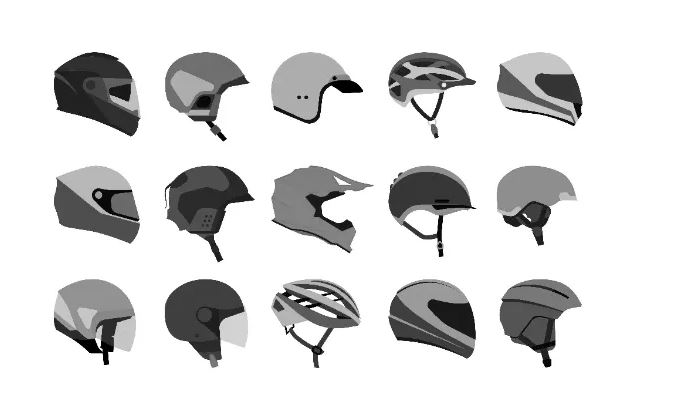Motorcycling Insights: Safety behaviours in Northern Ghana [Article]
As we step into the third quarter of 2023, we are excited to announce the commencement of our flagship initiative in Northern Ghana to investigate and address the safety behaviours of motorcyclists. Much like many other suburban areas in Africa, this region heavily depends on motorcycles as a primary mode of transportation.
As a result, motorcycles have become an indispensable and integral part of the local economy, contributing to its growth and development. Moreover, motorcycles have gradually become intertwined with the culture of the community, reflecting their significance and influence on daily life.
However, amid the significant reliance on motorcycles, there is a pressing concern regarding riding behaviours, particularly in various parts of Northern Ghana, where the neglect of basic safety gear has escalated into a hazardous trend. Disturbingly, children and minors are increasingly exposed to these unsafe riding habits, with parents often seen carrying two to even five minors on a single motorcycle while navigating busy streets at speeds ranging from 20 to 40 mph.
This alarming trend requires urgent attention and collective action. Over the next few weeks, we will be actively working to gain comprehensive insights into the evolving nature of motorcycling habits, existing motor policies and regulations, enforcement measures, accidents, casualties resulting from unsafe riding habits, and community perspectives.
We understand that these dynamics are interconnected, and we approach this project with an unbiased, open-minded attitude and a sense of curiosity. Our guiding principle is to look, listen and learn. With this in mind, our initial focus is the crucial steps of observation and documentation.
To ensure that our community engagements, experiments, and findings are captured visually and presented in a compelling manner, we have formed partnerships with Mariyak Studios and Kwesi Botchway. Their expertise in storytelling will enable us to curate a visual narrative that effectively communicates the essence of our work, our journey and the perspectives we encounter along the way.
Expect our online platforms to be teeming with intriguing content, including excerpts, findings from our experiments, and even short stories. We will be working closely with law enforcement agencies, regulators, health authorities, motor insurance providers, and public officials to understand how existing laws and regulations impact riding behaviours and why enforcement has faced challenges in achieving desired outcomes.
By actively involving these stakeholders, we aim to identify areas where improvements can be made to enhance road safety. Our partnership with health authorities and medical centres is instrumental in gathering valuable data regarding motorcycle accidents.
Through this collaboration, we seek to determine the frequency of recorded accidents, types of injuries sustained, underlying causes, and other relevant insights. We will also collect data on reported motorcycle-related accidents in the past five years from these health centres.
By analyzing the information provided by these stakeholders, we hope to uncover patterns, trends, and correlations between safety habits, accident frequency, accident-prone areas, specific times when accidents occur, etc.

We are also deeply interested in analyzing the patterns of helmet usage among motorcyclists, as helmets and side mirrors stand out as the primary safety indicators within the community. Our focus will be on understanding; the factors influencing individuals’ decisions to wear or not wear helmets, the implications this has for their safety, and the impact of helmet usage on accident statistics and the severity of injuries sustained in accidents.
Additionally, we will investigate the design aspects of motorcycle helmets and their impact on usage rates and effectiveness, specifically within the context of Northern Ghana.
How do factors such as comfort, fit, and ease of use influence adoption? How does helmet design also address specific challenges, such as road conditions and extreme weather faced by riders in Northern Ghana?
In addition to helmets, we will also investigate the matter of motorbike side mirrors. Side mirrors play a crucial role in providing motorcyclists with essential situational awareness, reducing blind spots, and aiding in making informed decisions on the road.
However, many riders often remove their side mirrors, overlooking the safety implications associated with this practice. We will closely examine the reasons behind this behaviour and seek to understand the attitudes and perceptions contributing to the removal of side mirrors and the reluctance to replace broken ones.
Through our comprehensive documentation, interviews and meticulous data collection, we aim to establish a robust baseline encompassing both quantitative and qualitative measures. This baseline will serve as a valuable reference point to gauge the effectiveness of our efforts and measure our eventual outcomes accurately.
Our ultimate focus lies in the development of impactful safety behaviour initiatives that will serve as catalysts for change in Northern Ghana and possibly other parts of sub-urban Africa where these behaviours are common.
We recognize that a fundamental shift in habits requires more than just uncovering the problem; it necessitates contextual understanding, targeted interventions and sustained efforts. We believe this initiative, Motorcycling Insights, will play a vital role in gradually reversing the prevailing unsafe riding habits and fostering a culture of responsibility and adherence to road safety norms in the communities we serve.
![Motorcycling Insights: Safety behaviours in Northern Ghana [Article]](https://worldfastcargos.com/wp-content/uploads/2023/07/11578-motorcycling-insights-safety-behaviours-in-northern-ghana-article.jpg)